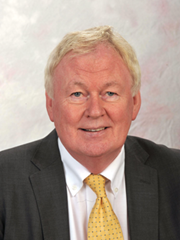Maurice Maxwell: making the most of Europe
 Seeking out opportunities and influencing policy at an early stage can pay dividends for Northern Ireland, Maurice Maxwell writes.
Seeking out opportunities and influencing policy at an early stage can pay dividends for Northern Ireland, Maurice Maxwell writes.
I’ve been asked to put on record my impressions of my time as Head of the European Commission’s Northern Ireland office which I have had the privilege of heading for the last four years.
When taking up post, I realised that there were a number of goals that I certainly couldn’t achieve. These included making the European Union ‘loved’ by the general population and the other was influencing the two major political parties to modify their fundamental objections to the EU (although all parties have been totally cooperative with my office in trying to maximise benefits from EU membership). I therefore decided to follow Commission President Barroso’s initiative to assist in helping the Northern Ireland Executive and other bodies to try to maximise the benefit that could be obtained from membership of the EU.
My objectives distilled into three main themes. The first was to increase the awareness, especially of local ministers and MLAs, of the importance of the EU for the making of laws and setting of policy measures which had important direct impacts on the lives of people here. The message was that we can’t ignore what is happening in Brussels and hope that it will go away.
On the contrary, if we intervene early enough, potential negative consequences can be anticipated, and the policy framers, in the European Commission and decision-makers in the European Council and European Parliament influenced to mitigate any unforeseen negative effects. To fulfil this mission, knowledge needs to be gained as to how these bodies function and how influence can be exercised. This requires direct action on the ground not only at Westminster but particularly in Brussels and Strasbourg.
The second main theme related to EU cohesion and structural funding, its continuance and knowledge of its existence and its importance for the economy and social structures here. Northern Ireland has been extremely successful in attracting generous EU funding over the years. For example, around €2.4 billion was received for the period 2007-2013.
I believed that there was a risk that assumptions were being made that such funding would dry up in the future and that there was nothing Northern Ireland could do to influence that. I have argued that, of course, overall budgetary constraints affect EU policy at the global level and affect decisions related to Northern Ireland. However, that doesn’t mean that there isn’t a job of persuasion to be done to ensure that the case for continued high levels of assistance is justified for this region into the future. Again, success requires that the necessary action is undertaken on the ground where it counts.
The third theme relates to funding for innovation, research and development. Northern Ireland can benefit to a much larger extent than previously from assistance of this nature. The total funding anticipated to be available for the period 2014-2020 is €80 billion. The nature of these funds is different from cohesion funding or support for agriculture. It is allocated on a competitive basis to those projects demonstrating the greatest excellence at an EU-wide level. It is therefore more difficult to access but the potential rewards in terms of innovation, business contacts and funding support are immense.
Again, the recipe for success is the same: knowledge and engagement in the decision-making process ‘up-stream’ so that potential partners in the research fields where our strengths lie are identified in good time for researchers here to be well placed to ‘win’ in the competitive funding process.
I suppose my main regret is that we have been unable to ensure that the benefits of EU membership, especially from the generous EU funding, have not been more widely publicised. However, to address this question a separate article would be required.





